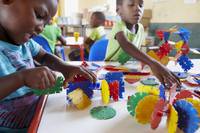
The Grade R Mathematics and Language Improvement Programme has developed a comprehensive set of resources designed for practitioners and teachers in the Foundation Phase. The set of resources - training guides, teacher guides and lesson plans for each term, and classroom materials, are designed and developed with the key objective to improve the quality of teaching and learning of mathematics and home languages. The outcome of this Gr R MLIP is to ensure that Gr R learners are adequately prepared for Gr 1. Additionally, the programme emphasises the importance of reading, writing, and collaborative text construction in the Grade R Foundation Phase.
This is a guide to optimise the use of the Mathematics and Language materials.
1. The resources are freely available under a Creative Commons licence. This allows for their use, distribution, and adaptation, provided that Wordworks and the University of Cape Town's School Development Unit are attributed in all future use. The following acknowledgement must be used in the respective sets of materials:
2. The Funder Group to the Gr R MLIP must also be acknowledged for their investments in these materials. In Mathematics, along with USAID, ZENEX, and Maitri Trust, are credited as the source.
The following acknowledgement must be used in all materials accessed from the Gr R MLI Programme:
“The development and production of these resources for the Grade R Mathematics and Language Improvement Programme were made possible by generous project funding from the Gauteng Education Development Trust (GEDT), the United States Agency for International Development (USAID), the Zenex Foundation and the Maitri Trust.”
The programme is divided into two components: The Mathematics Programme and the Language Program.
Mathematics Program
The objective is to strengthen the learning and teaching of mathematics in Grade R settings, It is important to note that a play-based approach is required. The program is structured and supported by a comprehensive kit of classroom resources.
Language Program
The Grade R Language Program emphasises the importance of young children's understanding of the purpose and value of reading and writing, as well as their participation in co-constructing texts. The program employs a story-based approach, where oral storytelling promotes language development and early literacy skills.It is important to note that a play-based approach is required.
This professional development programme includes a Home Language component worth 25 SACE points, available in 11 official languages, and a Maths component worth 15 SACE points. It is advised and encouraged that teachers, foundational phase departmental heads, subject advisers, and other stakeholders interested in utilising these materials complete the entire programme rather than selectively choosing specific topics.
This guide is developed for educators and implementing agencies that operate outside of Gauteng province. Should you reside and operate in Gauteng province, contact the GDE website for all the materials.
JET Education Services is the programme management office and can share more details on optimising your programme planning for Gr R.
Step-by-Step Guide
1. Visit the JET website.
2. Click on "Projects," then select "Grade R Mathematics and Language Improvement Programme."
3. Click on "Resources."
4. You will be directed to the details of the Creative Commons License for both the Home Languages and Mathematics materials. Click on the button that says, "Complete this form to access Mathematics and Language resources."
5. Fill out the form and submit it. This form requires you to opt into the Creative Commons licensing principles, specifically that no profit or financial gains will be derived from selling or trading with these materials.
*After submitting, you will receive your resources as per your request. * Should you be based in Gauteng, a school or ECD centre, contact the GDE to access the information.
Director for Early Childhood Development at the Gauteng Department of Education, Ms Phumelele Tloubatla, introduces the Grade R Mathematics and Language Improvement Programme (MLIP), watch the video below:
